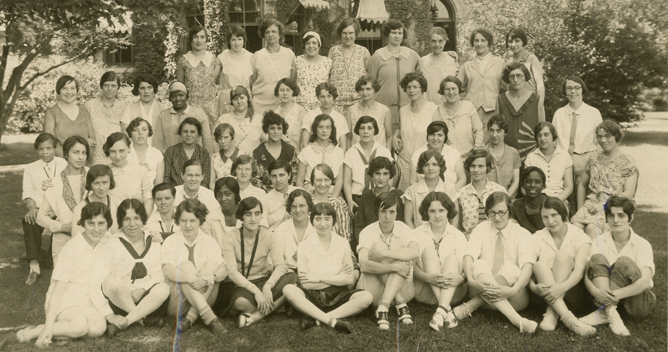Speaker Bio
Monica L. Mercado (BA, Barnard College; MA, University of Chicago) is a Ph.D. candidate in History at the University of Chicago. She is completing her dissertation "Women and the Word: Gender, Print, and Catholic Identity in 19th-Century America" as a fellow at Chicago's Center for the Study of Gender and Sexuality, where she directs an oral history initiative. Previously, she co‐curated the exhibition 'On Equal Terms'—Educating Women at the University of Chicago. From 2001 2004 she worked in program development at the Museum of the City of New York. She has taught history and gender studies at the University of Chicago and the University of Illinois Chicago.
View the website for "Closeted/Out in the Quadrangles: A LGBTQ History of the University of Chicago" at http://gendersexuality.uchicago.edu/projects/closeted
Monica can also be found on Twitter: @monicalmercado.
Abstract
Since 2007, the University of Chicago's Center for the Study of Gender and Sexuality and the Special Collections Research Center have built a unique collaboration to grow archival collections documenting the experiences of women and LGBT faculty, staff, and students on campus. With a commitment to hidden collections processing, the University archives has supported the research and writing of graduate student subject specialists in gender history, resulting in two exhibition projects: 'On Equal Terms'— Educating Women at the University of Chicago (2009) and Closeted/Out in the Quadrangles: A History of LGBTQ Life at the University of Chicago (forthcoming, 2015). Together, they will result in a deposit of approximately 150 alumni oral histories; an undergraduate internship program in oral history; two publications; and four archives-based undergraduate history seminars. Using both University projects—one completed, one still in development—as case studies, this paper invites conversation on the stakes of collecting gender and sexuality history in a digital age. What does it mean to once marginalized University communities to have a place in the physical archive? How do scholars' collaborations with traditional archives both expand and constrain our resources, particularly when it comes to going digital? In suggesting answers to these questions, the paper will also consider how current debates over "archival silences" have shaped the trajectory of public projects in women's and LGBT history.
On Equal Terms? The Stakes of Archiving Women's and LGBT History in the Digital Era
Since 2007, the University of Chicago's Center for the Study of Gender and Sexuality and the Special Collections Research Center have built a unique collaboration to grow archival collections documenting the experiences of women and LGBT faculty, staff, and students on campus. With a commitment to hidden collections processing, the University archives has supported the research and writing of graduate student subject specialists in gender history, resulting in two exhibition projects: 'On Equal Terms'— Educating Women at the University of Chicago (2009) and Closeted/Out in the Quadrangles: A History of LGBTQ Life at the University of Chicago (forthcoming, 2015). Together, they will result in a deposit of approximately 150 alumni oral histories; an undergraduate internship program in oral history; two publications; and four archives-based undergraduate history seminars. Using both University projects—one completed, one still in development—as case studies, this paper invites conversation on the stakes of collecting gender and sexuality history in a digital age. What does it mean to once marginalized University communities to have a place in the physical archive? How do scholars' collaborations with traditional archives both expand and constrain our resources, particularly when it comes to going digital? In suggesting answers to these questions, the paper will also consider how current debates over "archival silences" have shaped the trajectory of public projects in women's and LGBT history.

